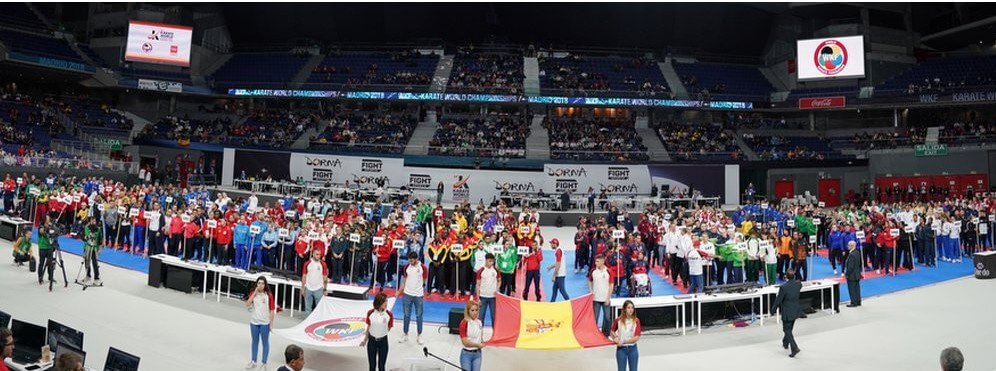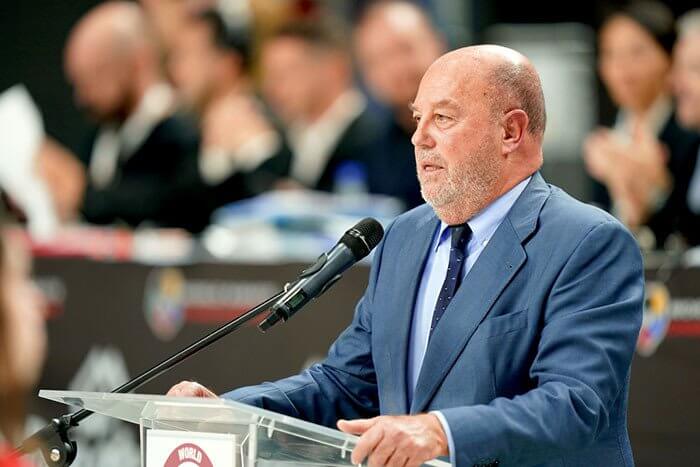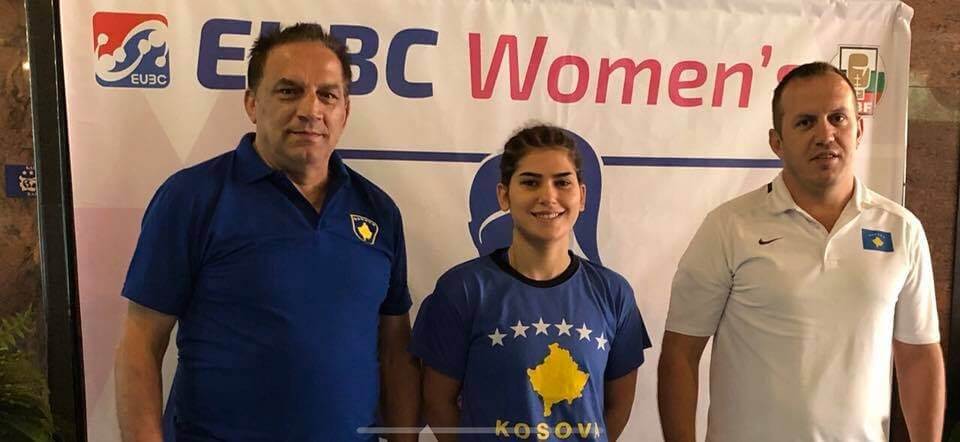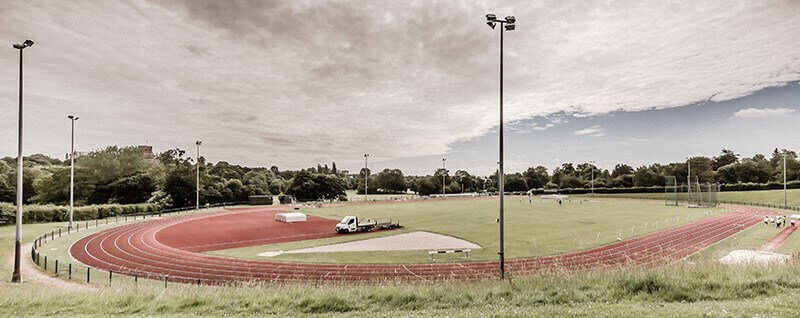It would appear the Spanish government have yet again been refusing athletes the right to participate in their sport. Earlier this year whilst at our very own World Masters Athletics Champs in Malaga, athletes from Gibraltar were refused entry
Olympic Movement guilty of paying lip-service to action when it comes to dealing with political discrimination against athletes
The World Karate Federation (WKF) was eager to publicise the record-breaking number of countries at its World Championships in Madrid last week.
Yet it was a nation competing at the event, but not officially, which dominated the headlines.
That country was Kosovo, who were refused permission to take part under their own flag by the Spanish Government in the latest example of a political obstacle being slammed in front of their sporting participation.
While Kosovan athletes were able to compete, they did so under the banner of “WKF5” as part of a protocol agreement reached by the WKF, the Government and the International Olympic Committee (IOC).
Later in the week, the initials KKF – Kosovo Karate Federation – appeared on the back of the athletes’ uniforms. But there was no mention of the country during the event’s entirety, while any depiction of symbols or flags was strictly prohibited.
It led to Kosovan athletes, all 13 of them, essentially boycotting the Opening Ceremony. Few inside the venue could blame them for that.
After all, the solution eventually reached did not please everyone. Quite the opposite, in fact.

WKF President Antonio Espinós was among the biggest critics, claiming the governing body could not understand why the same deal struck for Kosovan athletes at the Mediterranean Games in Tarragona could not have been imposed at their World Championships.
In Tarragona, athletes from Kosovo took part as the “National Olympic Committee of Kosovo” – although their flag was banned from the Opening Ceremony by the Government at the last minute.
“The same exception could have been very easy to do and allowed Kosovo athletes to participate under their symbols,” Espinós, a born and bred Spaniard, said.
“But at the end, this is what happened and unfortunately we were not able to change the mind of the Spanish Government.”
The 71-year-old, clearly agitated by the situation, followed that with a warning to his home country – let Kosovo compete as you do all the other countries or we will stop coming here.
Some might see that as Espinós paying lip-service to taking action but, when you consider Spain is due to host a Continental Championship and an event on the WKF’s premier circuit in 2019, the warning packs a slightly bigger punch.
The words from Espinós were followed by a similar threat from the IOC, who, after days of silence, finally fulfilled their role of acting as the guardian of the “Olympic Values and ideals” they so regularly champion when it suits them most.

“If the Spanish Government are not in the conditions to guarantee the access not only to Kosovo but to every athlete to compete, we should warn all International Federations (IFs) that, until this is solved, they should not hold international competitions there,” IOC deputy director general Pere Miró told insidethegames.
It was about time the IOC stepped in to condemn the actions of Spain. It was far too easy for them to do so when they urged IFs to “carefully consider” awarding events to Serbia and Kosovo after the former twice barred the latter’s karate team from entering the country to participate in the European Championships in Novi Sad.
Serbia and Kosovo are easy targets. The IOC were essentially shutting the stable door after the horse has bolted when delivering that thinly-veiled threat as the two nations do not stage many major events, certainly when compared with the likes of Spain.
The message from Miro, delivered on behalf of the IOC, was therefore a welcome one, providing it is not mere rhetoric and that the IOC are willing to carry through with their threat should another similar scenario arise.
In some ways, though, it was too reactive. It is unlikely the IOC would have responded on the specific Spain issue unless they were asked and it is plausible they may have stayed silent otherwise.
What is even more frustrating is that Kosovo’s participation at the Karate World Championships in a country which does not recognise it as an independent state was always going to be an issue.
It was clear the Spanish Government was not going to grant the Kosovan team the same rights as everybody else. While the WKF, Government and IOC were locked in prolonged talks on this for several months, Spain was never likely to change its stance.
In fact, the Spanish position has somewhat hardened over the past year or so following a declaration of independence from Catalonia.
Amid the ongoing political fragility in Spain, the Government do not want to risk an internal and domestic squabble about double standards and are reticent to alter their attitude as doing so may be used as a precedent by Catalan nationalists.
“I believe in the dialogue and I believe in solutions,” Miro added when asked if the IOC had not acted swiftly enough.
“I always believe in that and it has worked with what we have been doing. When it comes to Spain, we have been talking and talking.
“We have been solving it, with high difficulty, on a case-by-case basis. If we have a global agreement then this problem can be solved.
“If not, we should warn everyone that is responsible to say look, before giving that to Spain, make sure that they will accept the conditions of full participation of all athletes.”

Of course, this is an issue which stretches further than Kosovo – which became a fully-fledged member of the IOC in 2014, six years after gaining independence from Serbia – as athletes from Israel and Gibraltar are among others to have been discriminated against at sporting events for political reasons.
Just last year, organisers of the International Judo Federation (IJF) Abu Dhabi Grand Slam in the United Arab Emirates – which does not have diplomatic relations with Israel – caused controversy after they refused to raise the Israeli flag or play their national anthem when Tal Flicker won a gold medal.
Earlier in 2018, the IJF suspended the Abu Dhabi Grand Slam and the Grand Prix event in Tunis, which has previously refused to allow Israeli athletes into the country to compete. The event in Abu Dhabi was reinstated in September and competitors from the nation took part without prejudice.
In March, a national court in Tunisia banned four Israeli athletes from participating at the World Junior Taekwondo Championships in Hammamet. The ongoing problem in the African country prompted the IOC to briefly exclude the nation from bidding for the 2022 Youth Olympic Games, a suspension which was later lifted after the Government provided guarantees on Israeli competitors.
Gibraltar have also been subjected to similar treatment by Spain, which prevented athletes from the country from competing under their own flag during the World Masters Athletics Championships in Malaga in September.
Four of the five Gibraltar team boycotted, while the other – 800 metres runner Liam Byrne – carried out a protest of his own, unfurling his nation’s banner after he completed his race.
“The International Association of Athletics Federations (IAAF) supports Gibraltar’s right to have its athletes compete under its nation’s flag as they are a recognised European Federation,” IAAF President Sebastian Coe tweeted at the time.
“We urge World Masters Athletics to stand strong against this political interference.”
It is difficult to see where sport goes from here but ensuring countries which restrict the way other nations participate at competitions on political grounds are not given the privilege – and that is what it should be – of staging major events is a logical first step.

Talking about doing so is all well and good but the IFs and the IOC need to do more to protect athletes from every country, even if their mere existence is questioned by other nations.
The example to follow is that of the European Weightlifting Federation, which stripped Spain of its 2018 Junior and Under-23 Championships because of their stance on Kosovo.
Only then will these Governments get the message. After all, they are among the beneficiaries of their country hosting major sporting competitions.
IOC President Thomas Bach earlier this year called for the Olympic Movement to “show our teeth by other means and show that we are ready to take action”.
It is time they did exactly that.


